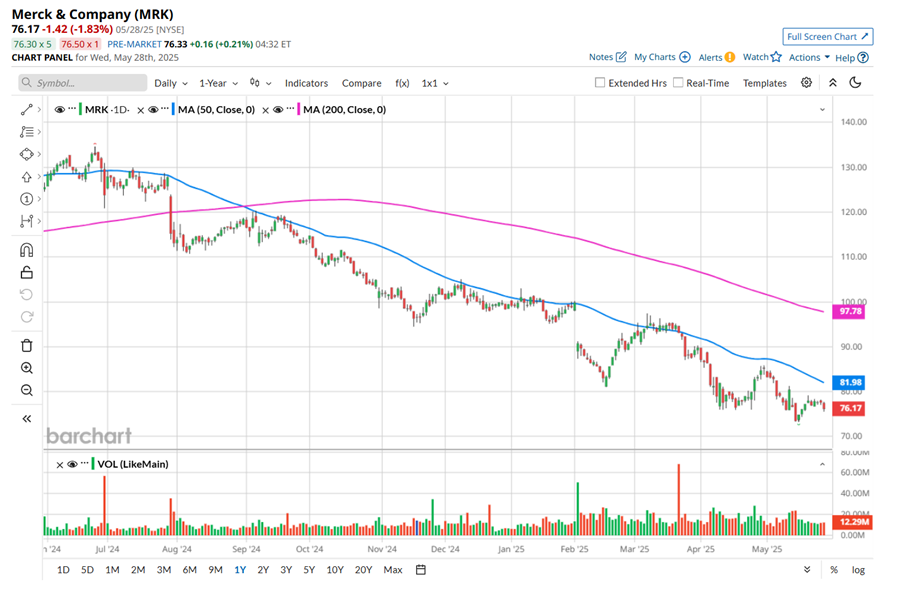/Merck%20%26%20Co%20Inc%20HQ%20-by%20Sundry%20Photography%20via%20iStock.jpg)
Valued at a market cap of $191.3 billion, Merck & Co., Inc. (MRK) is a healthcare company that offers human health pharmaceuticals for various areas, including oncology, vaccines, hospital acute care, cardiovascular, virology, neuroscience, and diabetes. The Rahway, New Jersey-based company also operates an animal health division, providing veterinary pharmaceuticals, vaccines, and services.
Companies worth $10 billion or more are typically classified as “large-cap stocks,” and MRK fits the label perfectly, with its market cap exceeding this mark, underscoring its size, influence, and dominance within the drug manufacturers - general industry. The company benefits from its strong research and development capabilities, a robust oncology portfolio, led by its top-selling cancer drug Keytruda, and its diversified business model that includes both human and animal health segments. It is a global leader in immuno-oncology and continues to expand its pipeline through innovation and strategic collaborations.
This pharmaceutical giant has dipped 43.4% from its 52-week high of $134.63, reached on Jun. 25, 2024. Moreover, it has declined 17.4% over the past three months, underperforming the broader Nasdaq Composite’s ($NASX) 1.4% rise over the same time frame.

In the longer term, MRK has fallen 39.6% over the past 52 weeks, considerably lagging behind NASX’s 12.2% uptick over the same time frame. Moreover, on a YTD basis, shares of MRK are down 23.4%, compared to NASX’s 1.1% decline.
To confirm its bearish trend, MRK has been trading below its 200-day moving average since late July, 2024, and has remained below its 50-day moving average since late June, 2024, with slight fluctuations.

On Apr. 24, shares of MRK surged 1.4% after its better-than-expected Q1 earnings release. The company delivered revenue of $15.5 billion and adjusted EPS of $2.22, both above Wall Street estimates. Moreover, its total sales fell 1.6% from the year-ago quarter mainly due to lower pharmaceutical revenue, while its adjusted EPS improved 7.2% on an annual basis. A rise in adjusted gross margin due to lower cost of sales, fueled by the favorable impacts of product mix and lower restructuring cost, supported its profitability. Additionally, its revenue excluding the impact of foreign exchange showed year-over-year growth, indicating underlying business strength.
Looking ahead to fiscal 2025, MRK reaffirmed its sales guidance and expects it to be between $64.1 billion and $65.6 billion. However, it lowered its adjusted EPS outlook in the range of $8.82 to $8.97.
MRK’s underperformance looks less pronounced when compared to its rival, Eli Lilly and Company’s (LLY) 11% loss over the past 52 weeks and 6.8% drop on a YTD basis.
Despite MRK’s recent underperformance relative to the broader market, analysts remain moderately optimistic about its prospects. The stock has a consensus rating of “Moderate Buy” from the 24 analysts covering it, and the mean price target of $103.86 suggests a 36.4% premium to its current price levels.
On the date of publication, Neharika Jain did not have (either directly or indirectly) positions in any of the securities mentioned in this article. All information and data in this article is solely for informational purposes. For more information please view the Barchart Disclosure Policy here.






